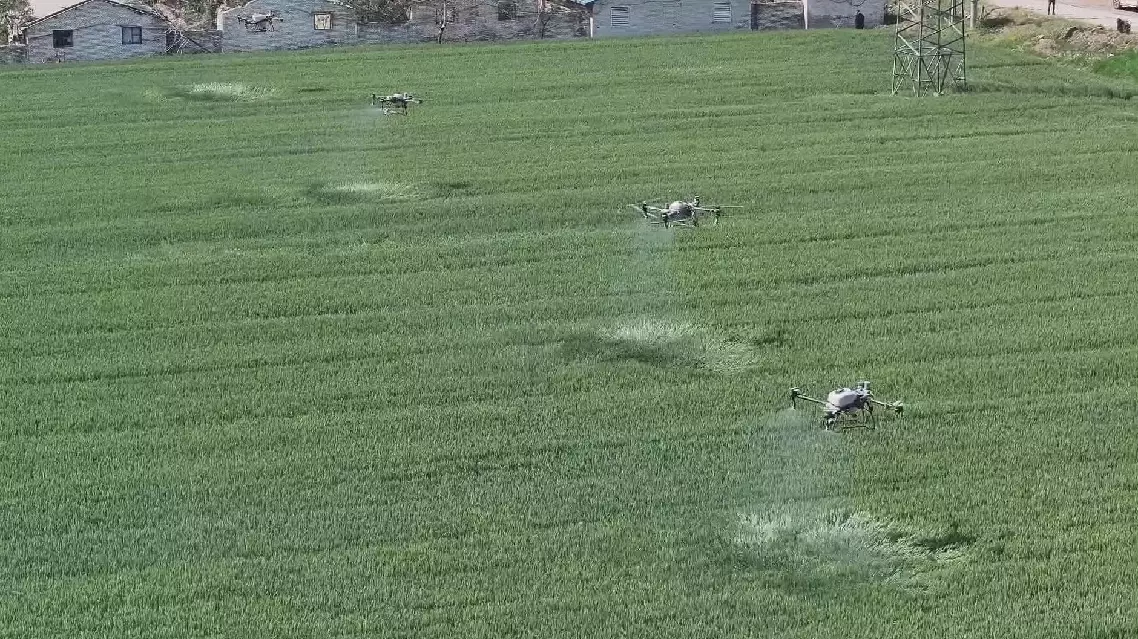At the foot of the Nanshan Mountains in Urumqi, the capital of northwest China's Xinjiang Uygur Autonomous Region, local musician Zhou Cheng has created a homestay and a campsite that blend music to help guests discover an ideal lifestyle.
At the homestay and the campsite he runs, the strumming of guitar folk songs by the campfire and the rhythmic beats of handpan drums under the night sky have become the signature sound. Visitors from near and far can experience not only the serenity of the starry skies after a day of hiking, but also feel the warmth of these campfire sing-alongs and impromptu late-night jam sessions.
"Nanshan is often referred to as 'the back garden of Urumqi.' As a native of Urumqi, after graduating from university, I decided to establish the first homestay in Nanshan when permission to run such businesses was granted. As for the name, 'Le' reflects my passion for music, while 'Ye' (meaning 'wild open space') symbolizes my hope that like-minded friends can come together in this space to relax and have fun," Zhou said.
As Xinjiang is renowned for its rich musical heritage, with a long tradition of songs and dances, Zhou often hosts parties and small bonfire gatherings, inviting local ethnic artists to perform at his homestay.
"After establishing the 'Leye' Homestay, we have created many songs. The homestay itself feels like a blessed place. The song 'From Today On,' which I composed, was ranked among the Top Ten Songs of the Year at the NetEase Cloud Music Original Festival. In 2019, I composed the official promotional song for the tourism project 'Xinjiang is a Nice Place,' featuring the handpan," said Zhou.
He noted that he frequently encountered challenges in songwriting, and during such times, he would often camp in the mountainous areas with his friends to seek inspiration. Over time, their shared passion for camping led them to the idea, "Why not establish a campsite?" Consequently, in 2022, they founded the "Yeluzi Camp."
"The campsite is very different from the homestay, which focuses on a comfortable indoor experience, while the campsite, set in the great outdoors amid nature, offers an entirely different feeling," Zhou said.
Zhou said he hopes his guests can escape the pressures of work and discover an ideal lifestyle there.
"Look, there are children playing on the swings. Despite the heavy snow, we hope these kids have a place to have fun here. This is the way life should be lived — not stressing out, feeling pressured by work, or worrying about money. This is the kind of life we should have," he said.
Zhou said his favorite spot at the campsite is the bubble houses. Whenever it rains or snows, he enjoys playing instruments, singing songs, and drinking tea with his friends and guests.
"Music is perhaps the most important thing in my life. Without the influence of music, there would simply be no 'Leye' Homestay or 'Yeluzi' Camp. We hope to continue our musical journey for many more years to come," Zhou said.

Xinjiang musician creates "utopia" to guide guests in discovering ideal lifestyle
Regions across China are leveraging drones and advanced farm machinery to manage grain production.
There are three different grain production seasons in China: summer grain, early rice and autumn grain, accounting for about 21 percent, 4 percent and 75 percent of the annual grain output respectively.
Traditionally, the summer harvest spans from May to late June in China every year, with most of the work focusing on reaping winter wheat, a staple grain crop, and rapeseed.
The winter wheat planted in more than 250,000 mu (16,667 hectares) of fields in Pinglu County, Yuncheng City of north China's Shanxi Province is now entering the ripening period which is crucial for the grain formation.
Located in a mountainous region, the county has scattered plots which poses challenges to manual pest and disease control. Facing the challenge, the county's agricultural department has designated the scattered plots as specific areas for drone spraying, combining human efforts with drone technology to ensure that no part of the field is left untreated.
The local authorities have deployed drones to cover over 30,000 mu (2,000 hectares) of crop fields per day. Flying over the fields, the drones are spraying pesticides and fertilizer to ensure the health and productivity of wheat crops and a bountiful summer grain harvest.
As the summer grain harvest draws near, major agricultural provinces, including Sichuan in southwest China, Hubei in central China, and Jiangxi in east China, have already begun harvesting rapeseeds.
In Zitong County, Mianyang City, Sichuan Province, rapeseed farmers are reaping a bountiful harvest. In a local agricultural park, six combine harvesters can be seen shuttling across the fields, with their gears whirring as rapeseed stalks being fed into the machines.
The entire process, from harvesting to threshing, separating, and crushing, is fully automated. The crushed rapeseed shells and straw are evenly spread across the fields, while the harvested seeds are transported to drying facilities before being sold or processed into oil for consumption.
This year, Zitong County has deployed over 1,200 harvesters to assist local farmers, with the mechanization rate in harvesting exceeding 80 percent, leading to a 30 percent reduction in harvesting costs. The full harvest is expected to be completed by the end of this month.
Meanwhile, in Jingmen City, Hubei Province, the introduction of two-stage rapeseed harvesting technology has substantially improved grain yields. The new technique involves cutting down the rapeseed, leaving it to dry on the field for a few days before using machines to gather and thresh the seeds.
This innovation has reduced the seed loss rate from 30 percent to less than 8 percent. By now, 758,000 mu (50,533 hectares) of the city's 2.32 million mu (154,667 hectares) of winter rapeseed have been harvested, accounting for more than 30 percent of the crop to be harvested. The harvest is expected to be completed by May 21.
In Linchuan District of Fuzhou City in Jiangxi Province, the rapeseed harvest is nearing its end. Local farmers are racing to take advantage of the favorable weather conditions, using advanced machinery to ensure a smooth and efficient harvest.
The area under rapeseed cultivation in the Linchuan District alone surpasses 100,000 mu (6,667 hectares). More than 2,800 farming households have begun harvesting since late April, with the mechanical harvesting rate exceeding 90 percent.

Chinese farms use drones, advanced farm machinery to manage grain production






















































